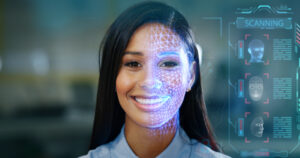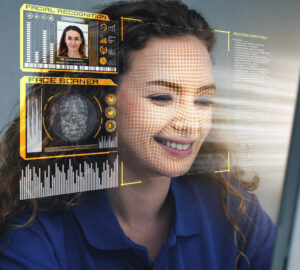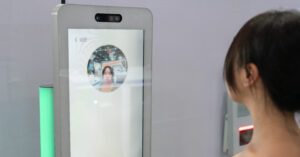Enhance the Guest Experience with Biometrics

Incorporating biometric technology into the Hospitality Industry has the potential to transform the way hotels operate. By enhancing security, streamlining check-in and check-out procedures, and personalizing the guest experience, biometric technology can help hotels to stay ahead of the competition. As hotel technology continues to advance, it is essential for hotels to embrace new technologies in order to stay competitive and to provide the best possible experience for guests.
What is Biometrics?
Biometrics is the measurement and analysis of unique physical or behavioral characteristics that can be used to identify individuals. Biometric technology can be used in the check-in and check-out process for guests and can be used to verify the identity of guests and eliminates the need for traditional check-in procedures, such as displaying identification and signing paperwork, saving guests time while improving the guest experience.
Facial recognition technology is an example of biometric technology that hotels can use to verify the identity of guests and staff and can also be used to personalize the guest experience. Hotels can use facial recognition technology to greet guests by name as they enter the hotel, or to suggest activities and amenities based on a guest’s past behavior.
Biometric technology such as fingerprint recognition can also be used to verify the identity of guests and staff, hotels can ensure that only authorized individuals are granted access to specific areas of the hotel.
Benefits of Biometrics in the Hospitality Industry
Enhanced Security
One of the key benefits of biometric technology is enhanced security. By using biometric data to verify the identity of guests and staff, hotels can ensure that only authorized individuals are granted access to parts of the hotel, such as guest rooms, storage areas, and back-of-house areas. Biometric authentication is a highly secure method of identification, and can help to reduce the risk of theft, fraud, and other security breaches.
Streamline Check-in and Check-out Procedures
Biometric technology can also help hotels to streamline the check-in and check-out procedures for guests. Traditional check-in procedures can be time-consuming and frustrating for guests, particularly during peak travel periods. The use of biometric data to verify the identity of guests, can eliminate the need for guests to present identification and sign paperwork, which can save time. Biometric authentication can be done quickly and seamlessly, making the check-in and check-out process much smoother.
Personalization
Biometric technology can also be used to personalize the guest experience. By analyzing biometric data, hotels can gain insights into guest preferences and behaviors, which can be used to personalize the guest experience. Hotels can use biometric data to adjust room temperature and lighting to a guest’s preferred settings, or to suggest activities and amenities based on a guest’s past behavior. This level of personalization can help to enhance the overall guest experience, improve guest satisfaction and create brand loyalty.
The Use of Biometric Technology is Increasing
According to the Face of the Future Report conducted by CyberLink, consumers are adopting facial recognition in high numbers, especially Gen Z and millennials. Facial recognition is being used in multiple mobile applications and locations like airports, banks and medical offices. 33% of Americans are open to using facial recognition technology at hotels for its convenience or to enhance the overall hotel experience. And 30% have used facial recognition technology for improved safety during their hotel stay.
The report surveyed 2,455 Americans about the many ways in which they would like to use facial recognition technology, if it is used correctly.
The report found that:
- 4 in 10 Americans use facial recognition to unlock at least one application per day.
- 68% used facial recognition to unlock phones, laptops or other personal computer and 51% used it to log-in to phone.
- 30% used facial recognition technology for improved safety at hotels, 55% at airports, 54% at banks and 53% at medical offices.
Implementation of Biometric Technology
The use of biometric technology in hotels is rapidly gaining popularity due to its potential benefits. Biometric technology can enhance security, streamline check-in and check-out procedures, and personalize the guest experience. However, implementing biometric technology in a hotel requires careful planning and execution to ensure its effectiveness and to protect guest privacy and data security.
Hotels must ensure that they have the necessary infrastructure in place to support biometric technology, such as high-quality cameras and sensors. They must also ensure that they have the necessary policies and procedures in place to protect guest privacy and data security. Biometric data is highly sensitive, and hotels must take appropriate measures to ensure that guest data is stored securely and protected from unauthorized access.
Vendor Spotlight: Zoox Pass for Hospitality
International technology solutions provider, Zoox Smart Data launched Zoox Pass to help hotels meet the demand for self-service technology by offering guests a seamless and personalized self-check-in service. The Zoox Pass self-check-in technology allows guests the option to authenticate their identities using their personal devices or by using the Zoox Pass kiosk. Guests can check-in 24/7 using the kiosk, the facial recognition feature instantly recognizes guests and retrieves their information to enable a seamless check-in. The self-check-in kiosks remove the need for guests to manually enter their information by enabling the scanning of guest documents and identification cards.
Hotels can take the guest experience to the next level by pairing Zoox Pass with the Zoox Smart Data Platform to locate guest profiles in order to analyze guest preferences. Once guests connect to the hotel’s WIFI network or to a Zoox hot spot, hotels can gather data regarding guest room preferences, meal preferences and other hotel activities in order to offer a more personalized guest experience. Guests who are concerned with their privacy can opt out of the facial recognition service and still benefit from the other Zoox Pass identification features.


